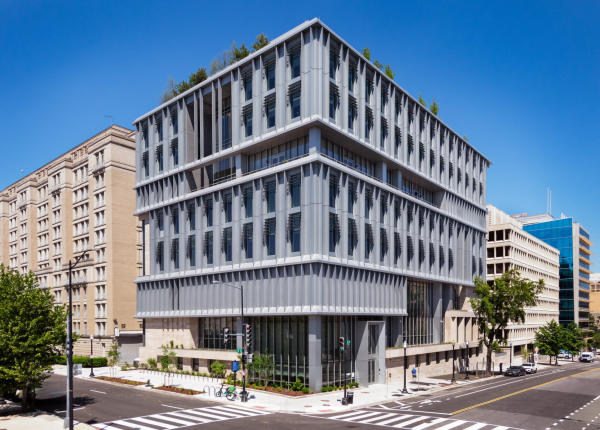The Washington, D.C. Zoning Commission, which oversees land use in the District, reviewed a proposed amendment to Georgetown University’s 2017-2036 campus plan to accommodate growth at the Capitol Campus during a Nov. 21 hearing.
The amendment proposes replacing references to the “Main Campus” with the “Hilltop Campus” and allowing 98 undergraduates studying at the Capitol Campus to take courses on the main campus. The public policy and environment and sustainability majors, intended to launch this fall, would require junior and senior students to live and take classes at the Capitol Campus.
Initial plans called for Capitol Campus students to take all classes at the Capitol Campus, but Robert M. Groves, the university’s interim president, said a low initial undergraduate population in Capitol Campus programs would require students to remain at the Hilltop Campus.

“We’re seeking dispensation to have a portion of them go up and take one, at most two, courses on the Hilltop during this interim phase,” Groves said.
Georgetown expects 140 undergraduate students on the Capitol Campus in Fall 2025, with the university seeking permission for 98 of them to take courses on the Hilltop campus at the meeting. Groves said he hopes for 1,000 undergraduate students to enroll in Capitol Campus programs eventually, providing a greater diversity of courses.
Allowing Capitol Campus students to enroll in Hilltop courses represents a shift from the university’s prior statements at an info session for the environment and sustainability program led by co-directors Randall Amster and Jesse Meiller and posted to YouTube April 15.
“There are some logistical ways to come back to the main campus for non-credit bearing experiences but, generally speaking, students will not be coming back to the Hilltop to take courses,” Amster said at the info session.
Marin Napolitano (CAS ’28) said she applied to Georgetown as a public policy major but dropped her major because the Capitol Campus offers limited coursework.
“I came in knowing I wanted to double minor in women’s and gender studies and justice and peace studies, and the way my classes are going, I’m not completing those minors before I would have to move to the Capitol Campus,” Napolitano told The Hoya. “If I still had to take classes here, I’d have to travel back and forth or not double minor at all.”
James Habyarimana, the faculty director of the undergraduate public policy program, said he intends for more course offerings on the Capitol Campus.
“We want all students who come down to the Capitol Campus to have access to all of the Capitol Campus programs and classes as well as those on the Hilltop,” Habyarimana told The Hoya. “Since both degree programs are joint degrees with the College, they will be teaching additional courses in areas aside from those offered by each of the downtown programs.”
A university spokesperson said students on the Capitol Campus will have access to academic opportunities beyond their major.
“Courses offered on the Capitol Campus will include a mix of major-specific courses, core curriculum courses and electives, including electives that could be combined to constitute a minor,” the spokesperson wrote to The Hoya. “Advising deans will provide guidance to students who are interested in pursuing minors — either on the Hilltop or on the Capitol Campus — and other academic opportunities.”
The Capitol Campus hosts Capitol Applied Learning Labs (CALL), a semester-long experiential learning program that requires students to enroll downtown.
Dylan Partner (CAS ’25), who was conditionally admitted to Georgetown as a transfer student to spend his first semester in the CALL program, said being separated from the majority of the campus population negatively impacted him socially.
Full Disclosure: Partner was previously a news staff writer and opinion columnist for The Hoya.
“We would joke that the CALL campus is basically studying abroad because it’s impossible to engage extracurricularly on the main campus,” Partner told The Hoya. “It’s really hard, even if you’re dedicated, to come on a weekly basis to participate in an extracurricular. I was ill-prepared to participate in Georgetown’s campus culture and I still feel the repercussions as a senior.”
Habyarimana said he hopes to shape the public policy program to allow students to continue participating in clubs and campus life on the Hilltop, even while living on the Capitol Campus.
“The McCourt School certainly has a pretty rich existing club culture, and we certainly expect that students will start their own clubs or join existing ones, but we certainly don’t think that is sufficient,” Habyarimana said. “I think we need to work out ways in which people can continue to interact between campuses.”